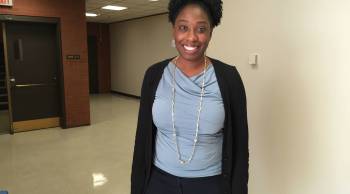Making professors more productive
Bob Moon: It’s fast become the rule in the business world: Squeeze out efficiencies, wherever you can find them.
In Texas, that productivity push is going to college. The University of Texas announced a plan today aimed at getting more out of its campuses and its professors. It calls for creating a new merit pay system, and a system for tracking faculty productivity.
But as Marketplace’s Amy Scott reports from the Education Desk at WYPR in Baltimore, exactly what “productive” means in academia is up for some serious debate.
Amy Scott: First a spoiler alert, if you happen to be reading “To the Lighthouse,” you might want to turn off your radio for a sec.
Student: I was shocked when she killed off Ms. Ramsey.
This is Mia Carter’s major authors course at UT Austin.
Student: It’s not even her death, it’s what happens after her death.
Just 14 students in sandals and flip flops sit in a circle, talking about Virginia Woolf. Carter says she likes it small.
Mia Carter: They get to know each other and spend really good time reading together and thinking together and learning how to argue, and that’s much easier in a small class.
But some critics of the university say professors like Carter aren’t teaching enough students, that they spend too much time in small classes, doing research or serving on committees. And with tuition rising faster than inflation, that’s a luxury no one can afford.
David Guenthner: The top fifth of faculty in terms of teaching loads are teaching an average of about 318 students per year. The other 80 percent of faculty are teaching approximately 63 students a year.
That’s David Guenthner of the Texas Public Policy Foundation. Its offices are in an unassuming bank building a few blocks from the state capitol. But the conservative think-tank is behind a growing movement to transform higher education in the state. Guenthner says if more professors taught more students, the university would need fewer teachers. And that would save millions of dollars that could offset tuition.
Guenthner: What we’ve been trying to do is to figure out, OK, for all the money that students and taxpayers are putting into the university, for all the money taxpayers are putting into the university, where’s it going, and what are we getting for it?
Both the Texas A&M and University of Texas systems have tried to answer those questions by publishing data on their faculty: their salaries, how many students they teach, how much grant money they bring in for research. A&M even highlighted — in red — which professors weren’t pulling their weight. A former University of Texas consultant came out with his own ranking system last month. Those with the lightest teaching loads and least grant money at UT were labeled “dodgers.” “Coasters” were considered only slightly better. Naturally, the faculty freaked out.
Alan Friedman: We do feel besieged here on the campus.
Alan Friedman has taught English at UT for more than 40 years. He’s incoming chair of the faculty council.
Scott: OK, so do you know how productive you are?
Friedman: I have no idea. I think I’m pretty productive.
Scott: OK, well, let’s take a look.
Friedman: All right.
We find Friedman in the raw data. He makes just under a hundred thousand dollars. Total number of students taught in the 2009 school year: 59. That would put him in solid “dodger” territory. But Friedman has won several teaching awards. He’s written five books, edited 10 others.
Friedman: The fact that I’ve chaired almost every standing committee at the university, the fact that I’m deeply involved with many of the things going on on the campus doesn’t show up anywhere.
Officials understand it’s a flawed system. But as more people question the value of a college degree, it raises other big questions about the purpose of a university. Is it to train qualified workers? Teach people to think? Discover new technologies?
Raymond Paredes is commissioner of the Texas Higher Education Coordinating Board.
Raymond Paredes: I do agree very strongly that we do need a proper balance among research, teaching, and service. So clearly we need to develop metrics that measure productivity in a way that takes into account the different ways that faculty work in different disciplines.
Sounds like that may take somebody out of the classroom for a while.
In Austin, I’m Amy Scott for Marketplace.
There’s a lot happening in the world. Through it all, Marketplace is here for you.
You rely on Marketplace to break down the world’s events and tell you how it affects you in a fact-based, approachable way. We rely on your financial support to keep making that possible.
Your donation today powers the independent journalism that you rely on. For just $5/month, you can help sustain Marketplace so we can keep reporting on the things that matter to you.


















